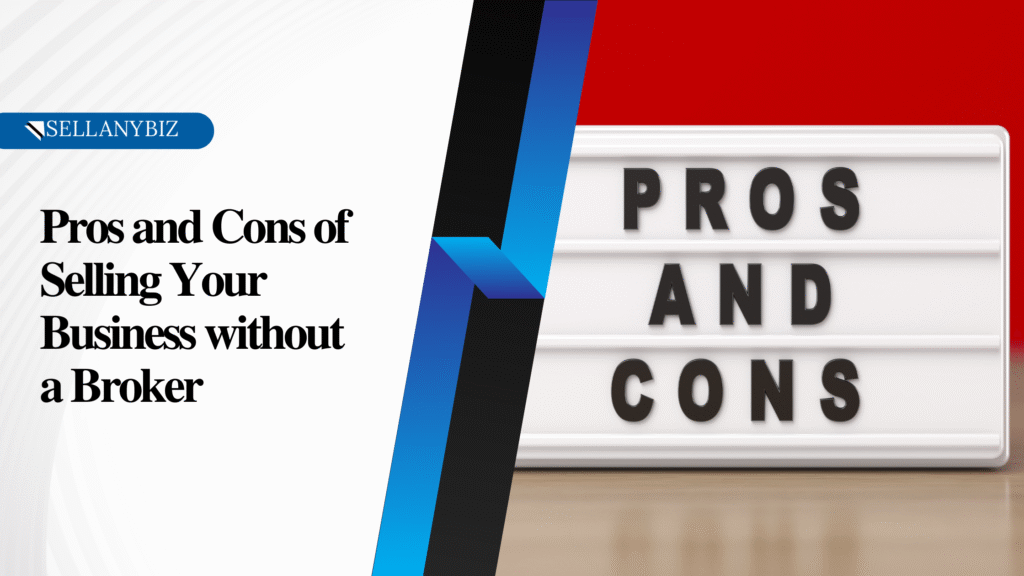Deciding to sell a business can feel exciting and overwhelming for many owners of small to mid-sized businesses. Often, they wonder if hiring a broker is necessary. One thing is certain—selling a business is a simple process. On the surface, handling the sale yourself may seem like an easy way to increase your earnings. Yet successful deals involve layers of legal, financial, and logistical work requiring both time and skill, along with a strong understanding of market movements.
This piece explores the benefits and drawbacks of selling your business and breaks down the major tasks you’ll need to manage if you choose to take charge.
Why Do Some Business Owners Sell Without a Broker?
Even though brokers provide useful services, some owners prefer handling their sales themselves. This often happens when the seller has already found someone interested in buying. Let’s explore more reasons.
Avoiding Broker Fees
Many owners try to avoid paying broker fees. Reducing costs can be tempting since higher profits are the goal when selling a business. Still, these fees cover important help and expertise during the entire process.
From setting the right asking price to marketing the business examining potential buyers managing negotiations, and completing all the legal documents experienced brokers often help sellers get a far better sale price than they could manage alone. In many cases, the higher price more than covers their charges.
The Risks and Challenges of Selling a Small Business without a Broker
Selling solo is possible, but it turns out to be tougher and riskier than expected. Getting a business sold is a big job with many details to handle. Below are some common struggles owners face when deciding to sell without using a broker.
Wrong Business Valuation
Determining how much your business is worth or learning how to price a business for sale can feel tricky. Business owners often overvalue their companies because they feel attached, or they overlook key financial details.
Setting the price too high might turn buyers away. On the other hand, pricing it too low can leave you walking away with less money than you deserve. Brokers bring in their market expertise, industry comparisons, and analysis to provide a clear valuation. Their advice tends to be reliable and often removes the need to pay for a pricey formal appraisal.
Reaching Fewer Buyers
If you sell without working with a broker, you might reach people you know or those from online ads. This limits your exposure and lowers your chances of finding the right buyer.
Unlike going it alone, brokers have huge databases filled with pre-screened buyers. They promote your business discreetly and keep everything confidential. This protects your operations, employees, and reputation while you go through the selling process.
Legal and Due Diligence Risks
Mistakes with legal documents can happen if you don’t have an expert. Sloppy NDAs incomplete contracts, or overlooked contingencies can cause big headaches later on.
Getting due diligence right can make or break a deal. Brokers ensure everything is managed. They stick to deadlines and meet all legal requirements. This reduces the risk of buyer dropouts, liability issues, or deals falling apart.
Emotional Stress and Bias
selling a business isn’t about finances. It can stir up strong emotions too. Many business owners struggle to stay neutral when handling offers dealing with criticism about their business, or stepping away from being in charge.
Brokers help as a calming force. They bring a clear mind and a professional approach. Their role focuses on protecting your interests, keeping emotions in check, and ensuring deals stay on track.
Important Documents and Preparation Steps
Being ready matters. Buyers will ask for honesty and trustworthiness.
You should collect and organize:
- 3–5 years of financial records and tax filings: Make sure they are accurate, consistent, and preferably checked or audited by a CPA.
- Adjusted profit and loss (P&L) report: Exclude one-time costs and perks specific to the owner. This shows what the earnings look like.
- Third-party business valuation: Even if you skip using a broker, think about bringing in a valuation expert to give an unbiased estimate of your company’s value.
- Confidential Information Memorandum (CIM): This summarizes your business’s strengths daily operations, growth opportunities, and financial details. It should look polished to appeal to serious buyers.
- Complete records of assets and liabilities: Include lists of equipment, lease contracts unpaid loans intellectual property information, and anything else that plays a role in determining value or transfer.
- Stay ready: Many sales fall apart during due diligence because records are messy. Organized books and a simple financial story can either seal the deal or cause it to crash.
Legal Steps and Closing Needs
Wrapping up a business sale can get tricky. If you skip hiring a broker, you and your lawyer need to handle:
- Due diligence tasks: Keep track of deadlines, answer requests for documents, and oversee any on-site checks.
- Writing and reviewing the purchase agreement: This document should outline the price, terms, conditions, guarantees, and non-compete agreements.
- Shifting licenses, permits, and leases: The buyer often needs these reassigned or reissued. This process involves approvals from landlords or local authorities.
- Organizing asset transfers: Owners must and hand over things like property titles, accounts intellectual property, stock, and equipment.
- Support after the sale: Buyers often expect a transition phase. It is important to agree on and document what your role will be during this time.
Why Many Business Owners Turn to a Broker Instead
You can sell your business on your own, but it comes with a lot of risk and responsibility. Working with a broker takes care of these challenges while letting you focus on keeping your business profitable until the deal closes. If you’re wondering, “Should I hire a broker to sell my business?” stick around to learn more.
Brokers make the sale smoother. They handle buyer negotiations, keep things confidential, and help you avoid costly errors. They often secure better deals or higher sale prices, which can make their fees worth it.
Here’s why many experienced business owners choose broker support:
1. Knowledge in Valuation, Planning, and Timing
One of the toughest parts of selling a business is figuring out the right price. If the price is too high, buyers tend to lose interest. If it’s too low, the seller might lose potential profit.
Brokers often rely on detailed market research knowledge of the industry, and past sale comparisons to set a price that attracts attention and seems fair. They also know the right times and methods to put your business on the market to ensure it gets noticed by the right audience.
Their understanding can guide you to:
- See the actual market worth of your business.
- Highlight the strengths of your company the right way.
- Pick the best time to sell based on trends in the economy or your industry.
Plenty of brokers even provide an initial value estimate either free or cheap. This upfront opinion gives you a better idea of what to expect and helps you prepare.
2. Finding Qualified, Serious Buyers
Brokers connect with networks packed with qualified and eager buyers who search for deals. These buyers range from private individuals and equity groups to strategic buyers, many of whom avoid listings that don’t go through professional channels.
This connection speeds up the sales process and boosts your chances of getting a full-price offer.
What’s more, brokers take care of screening buyers letting you focus on serious offers instead of wasting time with window shoppers.
3. Expertise in Deal Structuring and Negotiations
Selling a business isn’t just about agreeing on a price. Dozens of factors come into play, like earn outs, seller financing, escrow terms, transition help, and tax distribution.
Brokers are skilled at negotiating deals and work to protect the best outcome for the transaction while keeping everything on track. They handle tricky issues well and stop small problems from 9-+ruining deals’
This often separates a stalled discussion from a signed agreement.
4. Smooth Process and Better Results
In the end, business brokers aim to simplify, secure, and improve the selling experience. Most business owners who hire a trusted broker:
- Close deals faster
- Earn higher returns
- Steer clear of costly legal or financial mistakes
- Feel supported and more at ease during the whole process
SellanyBiz steps in to assist here. With over 15,000 businesses sold and a global network of skilled local brokers, SellanyBiz holds the title of the largest business brokerage firm in the world. We help businesses, no matter their size, to boost their value and ensure a seamless and well-informed handover.
Selling your business is one of the biggest financial decisions you’ll ever make. SellAnyBiz team of experienced brokers can guide you through this process with ease. This allows you to focus on running your business while we handle the finer points. Let’s talk about how we can make your sale successful. Begin by finding a trusted SellanyBiz broker to sell your business.























